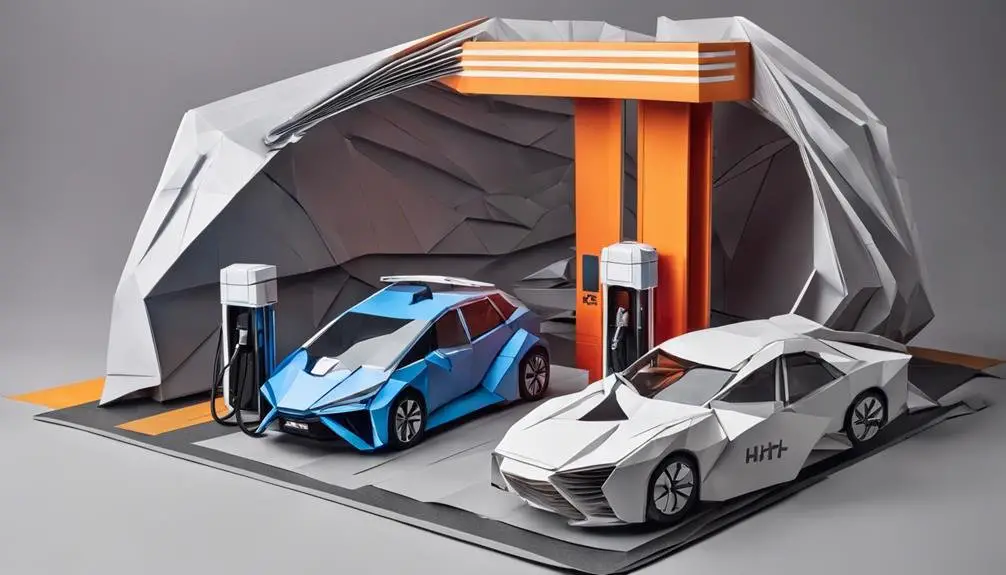Takeaways:
- Hydrogen fuel cells offer zero CO2 emissions during operation, promoting a cleaner environment.
- They face high production and adoption costs, limiting widespread use.
- Hydrogen storage and safety concerns require significant infrastructural investments.
- Advancements in green hydrogen production could overcome environmental and cost challenges.
| Pros of Hydrogen Fuel Cells | Cons of Hydrogen Fuel Cells |
|---|---|
| High energy efficiency | High initial costs |
| Zero tailpipe emissions | Hydrogen production challenges |
| Renewable source | Storage and transport issues |
| Quiet operation | Infrastructure limitations |
| Rapid refueling | Safety concerns |
| High energy density | Energy loss in production, storage, and conversion |
| Scalability and versatility | Limited consumer acceptance |
| Reduction in oil dependency | Dependency on critical materials |
| Economic development | Environmental impact of production methods |
| Technological innovation | Nitrogen oxides emissions |
Pros of Hydrogen Fuel Cells
- High energy efficiency: Hydrogen fuel cells convert the chemical energy of hydrogen into electricity with higher efficiency than traditional combustion-based power sources. This means that vehicles powered by hydrogen fuel cells can travel further on the same amount of fuel compared to gasoline-powered vehicles, making them more energy-efficient.
- Zero tailpipe emissions: The only byproduct of hydrogen fuel cells when generating electricity is water vapor, making them an environmentally friendly alternative to fossil fuel-powered vehicles. This characteristic significantly reduces the carbon footprint and helps combat air pollution and greenhouse gas emissions.
- Renewable source: Hydrogen can be produced from various renewable sources, such as water through electrolysis, making it a sustainable energy carrier. This ensures a potentially endless supply of hydrogen, contributing to energy security and reducing dependence on fossil fuels.
- Quiet operation: Hydrogen fuel cell systems operate quietly, reducing noise pollution compared to internal combustion engines. This makes hydrogen vehicles particularly suitable for urban areas, where noise pollution is a growing concern.
- Rapid refueling: Hydrogen fuel cells can be refueled in a matter of minutes, similar to traditional gasoline or diesel vehicles. This is a significant advantage over electric vehicles, which may require several hours to recharge their batteries fully.
- High energy density: Hydrogen has a higher energy density than batteries, allowing hydrogen fuel cell vehicles to have a longer range before needing to refuel. This makes them more suitable for long-distance travel without the need for frequent stops to recharge or refuel.
- Scalability and versatility: Hydrogen fuel cell technology can be scaled up or down to power a wide range of applications, from small portable devices to large power plants. This versatility makes hydrogen a flexible energy carrier for various industries.
- Reduction in oil dependency: By adopting hydrogen fuel cell technology, countries can reduce their dependency on oil imports, enhancing energy security and reducing susceptibility to oil price fluctuations.
- Economic development: The growth of the hydrogen fuel cell market can spur economic development by creating jobs in the production, distribution, and maintenance of hydrogen fuel cell systems and infrastructure.
- Technological innovation: Continued investment and research in hydrogen fuel cell technology can lead to further innovations, reducing costs and improving efficiency, making hydrogen a more competitive and sustainable energy option.
Cons of Hydrogen Fuel Cells
- High initial costs: The production and deployment of hydrogen fuel cells are currently expensive due to the high cost of fuel cell materials and the hydrogen production process. This makes hydrogen-powered vehicles and infrastructure more costly than traditional fossil fuel alternatives.
- Hydrogen production challenges: Most commercially produced hydrogen is currently derived from natural gas, a process that emits carbon dioxide. Producing hydrogen in an environmentally friendly manner through electrolysis requires significant amounts of electricity, preferably from renewable sources, which is not always available or cost-effective.
- Storage and transport issues: Hydrogen gas has low density, requiring high-pressure tanks or cryogenic temperatures for effective storage and transportation. This adds complexity and cost to the hydrogen supply chain, hindering its widespread adoption.
- Infrastructure limitations: The lack of hydrogen refueling infrastructure is a significant barrier to the adoption of hydrogen fuel cell vehicles. Building a comprehensive network of hydrogen stations is expensive and requires substantial investment.
- Safety concerns: Hydrogen is highly flammable and requires careful handling and storage to prevent leaks and explosions. Ensuring safety adds to the complexity and cost of hydrogen systems.
- Energy loss in production, storage, and conversion: The process of producing, storing, and converting hydrogen into electricity involves energy losses at each stage, making it less efficient in terms of overall energy use compared to direct use of electricity in battery electric vehicles.
- Limited consumer acceptance: Public awareness and acceptance of hydrogen fuel cell technology are still relatively low. Convincing consumers to switch from conventional vehicles to hydrogen-powered ones requires overcoming perceptions about cost, safety, and convenience.
- Dependency on critical materials: Fuel cells often require precious metals like platinum as catalysts, which are expensive and have limited availability. This dependency can lead to supply chain vulnerabilities and increase costs.
- Environmental impact of production methods: If hydrogen is produced using fossil fuels without carbon capture and storage, it negates the environmental benefits by contributing to greenhouse gas emissions.
- Nitrogen oxides emissions: Although hydrogen fuel cells emit only water vapor when generating electricity, the production of hydrogen, especially through steam methane reforming, can lead to the emission of nitrogen oxides (NOx), pollutants that contribute to smog and have adverse health effects.
Hydrogen Fuel: A Clean Alternative
Hydrogen fuel cells stand out as a sustainable solution, producing zero CO2 emissions during operation and positioning themselves as a clean alternative for both transportation and energy generation. This remarkable attribute makes them an invaluable asset in the global quest to curb pollution and combat climate change. Unlike traditional fossil fuels and internal combustion engines that release harmful pollutants into the atmosphere, hydrogen fuel cells offer a pathway to significantly improve air quality and reduce environmental degradation.
The advantages of hydrogen fuel cells extend beyond their zero-emission capability. The technology’s quick refueling time, approximately three minutes, ensures minimal downtime for vehicles and equipment, providing unparalleled convenience and efficiency for users. This feature is especially beneficial in transportation and logistics, where time is of the essence. Furthermore, with their high energy density, hydrogen fuel cells are capable of delivering longer operation times compared to other energy sources, including some batteries. This makes them particularly suited for applications where extended use is critical, such as in long-haul transport and continuous energy generation scenarios.
Despite facing some challenges, the energy densities of hydrogen fuel cells are comparable to those of lithium-ion batteries, showcasing their potential versatility and applicability across a wide range of sectors. This positions hydrogen fuel cells as not just an environmentally friendly option, but also a technologically viable and competitive alternative in the energy landscape.
Efficiency and Performance Benefits

One of the most compelling advantages of fuel cell technology is its superior energy efficiency, exceeding 60%, which significantly outperforms the 30-40% efficiency rate of internal combustion engines. This stark contrast in energy utilization highlights the technological advancements and potential of hydrogen fuel cells in delivering a more efficient power source.
Beyond their impressive efficiency, fuel cells are known for their consistent power output and performance. Unlike traditional power sources, which may suffer from degradation over time, fuel cells maintain their performance levels throughout their lifespan, ensuring reliable energy supply without faltering.
Moreover, the high energy density of hydrogen allows fuel cells to operate for longer periods than conventional batteries. This attribute is particularly beneficial in applications requiring sustained power, such as in transport and stationary power generation, where extended operation times are critical.
Additionally, the quick refueling times of about 3-5 minutes for fuel cell vehicles vastly improve convenience for users, offering a practical alternative to the lengthy charging periods associated with electric vehicles. These performance benefits underscore the potential of hydrogen fuel cells to revolutionize energy consumption and supply, providing a robust and efficient power solution.
Environmental Impact Reduction

Addressing the pressing issue of environmental degradation, fuel cells emerge as a pivotal technology in significantly reducing greenhouse gas emissions and improving air quality. As the world grapples with the adverse effects of climate change, the adoption of hydrogen fuel cells represents a forward-thinking move towards a sustainable future. These cells, by virtue of producing almost zero emissions, play a crucial role in minimizing the global carbon footprint, thereby contributing to a cleaner and healthier environment.
Moreover, hydrogen fuel cells offer the added advantage of reducing both noise and visual pollution, making them an attractive option for urban and densely populated areas seeking to lower pollution levels. This reduction in environmental disturbances not only enhances the quality of life but also supports biodiversity by providing a less intrusive human footprint.
The environmental benefits of hydrogen fuel cells extend beyond urban settings, making them ideal for use in versatile applications and remote areas where traditional energy sources are impractical or unavailable. By leveraging the clean energy potential of hydrogen fuel cells, we can significantly mitigate the impact of human activities on the planet, ensuring a greener, more sustainable world for future generations.
Challenges in Hydrogen Production

Transitioning to the challenges in hydrogen production, it is crucial to highlight the significant hurdles that impede its widespread adoption. High production costs, environmental impacts, and energy efficiency concerns stand as substantial barriers.
These challenges necessitate innovative solutions to make hydrogen a viable and environmentally friendly energy source for the future.
High Production Costs
A significant challenge in the production of hydrogen fuel cells lies in the high costs associated with their extraction and manufacturing processes. These costs stem from a variety of factors that significantly impact the economic viability of hydrogen as a clean energy solution. To paint a clearer picture:
- Expensive extraction processes are a primary cost driver, requiring significant energy input.
- Reliance on fossil fuel sources for the majority of hydrogen production not only increases costs but also contradicts the goal of achieving a cleaner energy future.
- The need to address intermittent energy supply issues adds layers of complexity and expense to production infrastructure.
- Technological limitations in efficient hydrogen production and storage further escalate the costs, hindering broader adoption and development.
These factors collectively contribute to the high production costs of hydrogen fuel cells, presenting considerable challenges to their widespread implementation and acceptance.
Environmental Impact
While hydrogen fuel cells offer a promising path toward clean energy, their production is currently marred by significant environmental challenges. The predominant method, deriving hydrogen from fossil fuels, significantly contributes to carbon dioxide emissions, undermining the environmental benefits.
An alternative, green hydrogen production through water electrolysis, presents a more sustainable solution with minimal environmental impact. However, the transition from grey to green hydrogen production faces hurdles, necessitating substantial advancements and investments. Moreover, carbon capture and storage technologies are under exploration to lessen the environmental footprint of hydrogen production.
The development of renewable energy sources for hydrogen production emerges as a critical step towards mitigating these environmental concerns, highlighting the need for a concerted effort to shift towards more sustainable production methods.
Energy Efficiency Concerns
Shifting our focus to the realm of energy efficiency reveals significant challenges in the production of hydrogen, particularly in terms of the energy-intensive nature of electrolysis. Despite the promise of hydrogen as a clean energy carrier, its production process currently faces hurdles that must be addressed to enhance its sustainability and efficiency.
- Hydrogen production through electrolysis demands high energy inputs, raising concerns about its overall energy efficiency.
- While green hydrogen produced using renewable energy sources offers a more efficient alternative, scaling up these methods remains a challenge.
- The efficiency of different hydrogen production techniques directly influences the sustainability of hydrogen fuel cells.
- Innovations aimed at improving electrolysis technology are crucial for balancing energy input with output, thus maximizing energy efficiency and minimizing environmental impact.
The Cost Barrier

One of the most significant obstacles to the broader adoption of hydrogen fuel cells is the high cost associated with the production of green hydrogen. Currently, the majority of global hydrogen production is dependent on fossil fuel sources, which contradicts the goal of transitioning to cleaner energy alternatives. This reliance not only exacerbates environmental concerns but also presents a significant barrier to the economic viability of hydrogen as a widespread energy source.
The challenge of balancing the intermittent supply of renewable energy further complicates the cost-effective implementation of hydrogen fuel cell technology. These fluctuations in energy availability necessitate advanced storage and conversion solutions, which, as of now, remain costly due to current technological and infrastructural limitations.
Moreover, the ongoing debate regarding the advantages and disadvantages of hydrogen fuel cells plays a crucial role in shaping investment decisions and policy development. This uncertainty can hinder the allocation of resources needed to overcome cost barriers, thereby slowing progress toward cost reduction and improved accessibility of hydrogen fuel cell technology. As a result, addressing these cost concerns is pivotal for the future success and adoption of hydrogen fuel cells as a viable alternative energy source.
Infrastructure and Storage Issues

The development of hydrogen fueling infrastructure presents considerable technical and financial challenges that are critical to the wider adoption of hydrogen fuel cells. A robust infrastructure is essential for the successful deployment of hydrogen as a clean energy source, but the journey towards achieving this goal is fraught with obstacles that stakeholders must navigate.
- Capital Investment and Local Approval: Establishing a comprehensive network of hydrogen fueling stations requires significant upfront capital investment. Moreover, securing approval from local authorities adds an additional layer of complexity, potentially slowing down development.
- Energy Loss and Safety Risks in Storage: Hydrogen gas storage is not without its challenges. It involves inherent energy loss during the conversion process, and its highly flammable nature raises safety concerns that must be meticulously managed.
- Additional Costs for Fuel Delivery or Generation: Organizations may face extra expenses related to the delivery of hydrogen fuel or the installation of on-site hydrogen gas generation facilities, impacting the overall feasibility of hydrogen fuel cell projects.
- Corrosion Issues: The risk of hydrogen gas corroding metal containers if containment is compromised adds another dimension to the storage challenge, necessitating advanced materials and technology to ensure long-term durability and safety.
Safety and Regulatory Concerns

Although hydrogen fuel cells offer a promising alternative to fossil fuels, their highly flammable nature necessitates stringent safety measures and regulatory compliance during storage, transportation, and usage. The volatility of hydrogen not only poses significant safety risks but also mandates organizations to navigate complex regulatory landscapes. Gaining approval from local governments and fire departments becomes a crucial step in the deployment of hydrogen fuel cells, ensuring that every aspect of their handling meets the highest safety standards.
The management of hydrogen fuel, whether through deliveries or on-site generation, involves additional costs that organizations must bear to maintain safety and compliance. This includes investing in safe storage methods, which, despite being essential, lead to inherent energy losses and further safety risks. These storage challenges are compounded by the flammable nature of hydrogen and its potential to corrode metals if containment systems fail. Therefore, strict safety protocols and infrastructure considerations are indispensable to prevent accidents and ensure the safe adoption of hydrogen fuel cells.
Balancing these safety and regulatory concerns with the benefits of hydrogen fuel cells is critical for their successful integration into our energy systems.
Conclusion
In conclusion, hydrogen fuel cells present a promising alternative to conventional energy sources, offering significant advantages in terms of efficiency, performance, and environmental impact.
However, the adoption of this technology faces substantial challenges, including the complexities of hydrogen production, economic considerations, infrastructural needs, and safety regulations. Addressing these issues necessitates comprehensive strategies that balance technological innovation with environmental sustainability and economic viability.
The future of hydrogen fuel cells hinges on overcoming these hurdles to harness their full potential as a clean energy solution.










